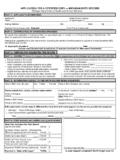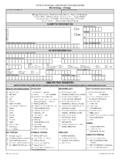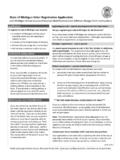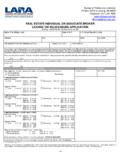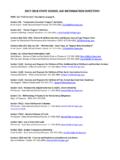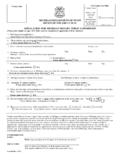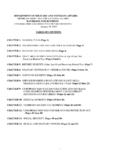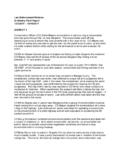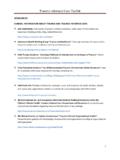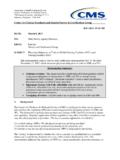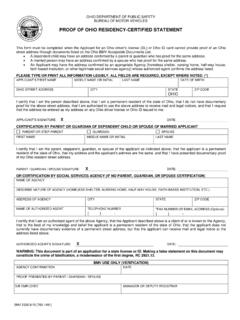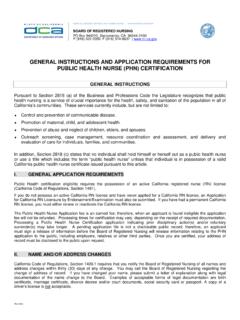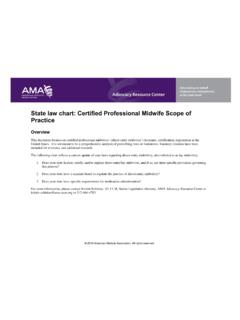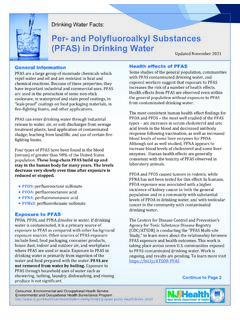Transcription of Nursing Facility Eligibility - Michigan
1 MDCH-726 (05/2017) Nursing Facility Eligibility MDCH-726 (05/2017) - 1 - Introduction This booklet is about getting Medicaid benefits for persons who expect to be in a Nursing Facility for at least 30 consecutive days. If you are in a Nursing Facility for an extended period, Medicare and other insurance may not cover all the cost of your Nursing Facility care. Medicaid may be able to help with these costs. Medicaid covers Nursing Facility care when it is medically necessary. There are limits on the amount of income and assets you may have and still get Medicaid health care coverage. Medicare covers health care for people age 65 and over or who are disabled. No income or asset limitations apply. See Appendix II: "Programs to Help You" for your information. You can have Medicaid and Medicare at the same time. Long-term care insurance, Medicare and other private insurance are sources of payment that may cover all or part of Nursing Facility costs.
2 These other sources of payment may pay the beneficiary directly which must be passed on to the provider. If you have a spouse, pay close attention to the sections of this booklet that explain how your spouse's income and assets can affect your Medicaid Eligibility . The rules about qualifying for Medicaid can change. Check with your local Michigan Department of Health and Human Services (MDHHS) office for more information before making any decision. In this booklet "I", "you," "your" and "my" mean the person in the Nursing Facility . "We, "us" and "they" mean MDHHS. Applying for Medicaid Coverage in a Nursing Facility What should I do first? You will need to work through your local MDHHS office. You may apply for Medicaid at any time. To apply for Medicaid, contact the MDHHS office in your area. Ask for a Medicaid Application Patient of Nursing Home (DHS-4574).
3 You can pick it up, your local MDHHS office can mail it to you or you can download it online at: >> Doing Business with MDHHS >> Forms & Applications >> Medicaid Application Patient of Nursing Home (DHS-4574). You may have someone help you fill out the form. Tell MDHHS if you need help. Bring or mail the signed and dated form to your local MDHHS office. If you have past medical bills, your Medicaid coverage may begin by going back up to three months before the month you apply. You should apply for past coverage even if you have other insurance that might cover the cost. You will need to fill out an Asset Declaration form (DHS-4574-B) . You may not need to apply for Medicaid now. But be sure to contact us if you have been, or think you will be, in a hospital or Nursing Facility for 30 continuous days. If you have a spouse, you must fill out an Asset Declaration form, DHS-4574-B.
4 This will be used to help determine your Eligibility . After I apply for Medicaid, what happens? Your local MDHHS office will decide if you are eligible for Medicaid. They will send you a letter with their decision: within 45 days, or within 90 days if you have a disability. The Nursing Facility must be certified by Medicaid to provide the care you need. Medicaid only pays for services that are medically necessary. Medicaid only pays for Nursing Facility , MI Choice waiver and the Program of All Inclusive Care for the Elderly (PACE) services when you have been determined medically/functionally eligible via the Michigan Medicaid Nursing Facility Level of Care Determination. MDCH-726 (05/2017) - 2 - If you are eligible, you will receive a mihealth identification card. You should also receive a notice from your caseworker advising you of the amount you are required to pay toward the cost of your care while in the Nursing home.
5 This is called a Patient-Pay Amount. Your Nursing Facility will bill Medicaid for the portion of the bill you are not expected to pay. If you have applied for Medicaid, you must inform your medical provider (doctor, hospital, pharmacy, Nursing Facility , etc.) that you have applied for Medicaid prior to receiving medical service. You must give your medical provider a copy of your mihealth card as soon as it is received. Your medical provider needs this information to receive prompt payment for medical services provided to you. This information is also necessary in order to issue you a refund if you pay for the services between the date you file an administrative hearing request with MDHHS after they issued an incorrect Medicaid denial, and the date of an Eligibility determination resulting from your hearing request. It is the responsibility of the medical provider to submit any outstanding medical bills, using Medicaid billing procedures, to the Medicaid office within 12 months from the date of the Medicaid covered service.
6 Exceptions to the 12-month billing policy may be authorized if the delay in billing is caused by an agency error or as the result of a decision handed down by court order or administrative hearing decision. What will MDHHS ask me? To determine if you are eligible for Medicaid: We will ask you about your: Income and assets Age Medical expenses Marital status Medical insurance If you have a spouse, we will also ask about: Your spouse s assets Your spouse s income Income of other dependents at home This is a two-step process. First we determine whether you are eligible on the basis of your assets. This is called asset Eligibility . If you are asset-eligible, then we review your income. If you have too many assets to qualify for Medicaid benefits, your application may be denied. What if I have other insurance? Federal law and regulations require beneficiaries to use all other sources of payment available to them to pay for all or part of their medical care before Medicaid provides payment.
7 The reporting of these other sources is required by the beneficiary and provider and can provide beneficial protection to the beneficiary s estate. Reporting other sources of payment will not affect your Medicaid coverage. If another source of payment is made directly to you, you may be held liable to reimburse Medicaid for these costs. You can report other sources of payment to Medicaid by contacting the Beneficiary Help Line at 1-800-642-3195. Office hours are Monday through Friday 8 am to 7 pm. To report other sources of payment (such as long-term care insurance) to the Nursing home, call the Nursing home directly. What will I need to verify? We will need proof of your income and assets. If you have a spouse, we will need proof of his or her income and assets, too. If you are under age 65, we may need proof of your disability. We will need proof that you are a citizen.
8 The documents we need include: Bank statements, including joint accounts MDCH-726 (05/2017) - 3 - Pension payment information Social Security benefit information Real estate value (including home) Recent medical bills You must have a Social Security number. If you do not have one, we will help you apply for one. Your Assets What assets does MDHHS count? The most common assets we count are: Money in: Cash, savings accounts and checking accounts Credit union share and draft accounts Certificates of deposit Savings Bonds Individual Retirement Accounts (IRA) and Keogh plans Nursing Facility trust funds Prepaid funeral contracts that can be canceled Trusts, depending on the terms of the trusts Annuities Equity in: Real estate (other than your home) More than one car Boats or recreational vehicles Stocks, bonds and mutual funds Land contracts or mortgages held on real estate sold See Appendix II for more help determining your assets.
9 What assets does MDHHS not count? These are the most common assets we do not count: Your primary residence for Medicaid Eligibility , but do count the equity when determining Medicaid payment for long-term care services. Personal belongings and household goods One car Burial spaces and certain related items for you and your immediate family.* Up to $1,500 designated as a burial fund for you or your spouse, if you have one.* Irrevocable prepaid funeral contract.* Value of life insurance if total face value of all policies is $1,500 or less per owner, or term insurance of any kind.* Assets that you do not have the legal right to use or dispose of. If you have a spouse, the same is true of assets your spouse does not have the legal right to use or dispose of. Assets you or your spouse have not been able to sell. You must have had the asset up for sale for at least three months prior to application and must continue until the property is sold.
10 Your asking price must not have been more than the fair market value. You must not have turned down a reasonable offer. These assets must remain for sale as long as you receive Medicaid. * For more information, see page 5 - What about funeral costs? MDCH-726 (05/2017) - 4 - What if I have a joint account with someone other than my spouse? We count the entire amount as yours unless you prove some of the money belongs to another person. This rule applies to cash assets, such as: Savings and checking accounts Credit union share and draft accounts Certificates of deposit Savings Bonds What about other assets I own with someone else? We assume each person owns an equal share. Tell us if the ownership is different. How does MDHHS determine my asset Eligibility ? Your asset limit is $2,000. You are asset-eligible if your countable assets for the month are $2,000 or less.
